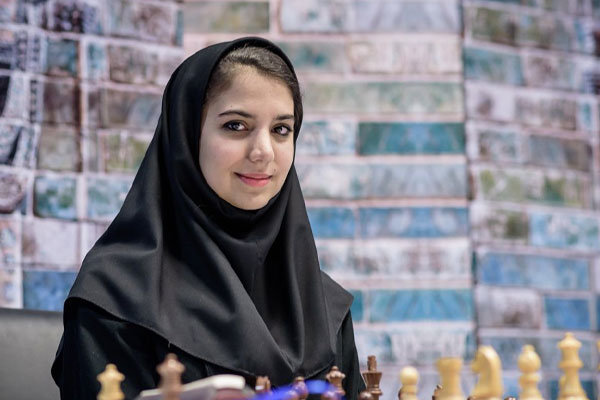Sarasadat Khademalsharieh: Chess has a great future in Iran

Sarasadat Khademalsharieh, who won her first major title aged 12, talks of a sport gaining popularity among young people in Iran.
Sarasadat Khademalsharieh is a 19-year-old chess player from Iran who holds the titles of International Master and Woman Grandmaster.
Like most other chess players, Khademalsharieh took up chess at an early age. She was eight when she first touched a chess board. Four years later, she was a world champion, winning the under-12 world championships.
Questions were asked when Tehran was named host of the 2017 women's world championships.
Nazí Paikidze, US women's champion, called for a boycott of the games.
But Khademalsharieh shares the tale of a sport gaining popularity in Iran, especially among girls and the youth.
You took up chess at the age of eight and, four years later, you were a world champion. How did that happen?
I was in the second grade when my friend talked about playing chess. I hadn't seen a chess board before. No one from my family played chess. I just took it up randomly and I guess I started liking it a lot. That's why I put in a lot of hard work, lot of effort - training for six to seven hours as a kid. I guess it all paid off four years later.
Chess wasn't a common sight in Iran at that time. Was your family supportive of your decision and did it affect your studies?
My family actually liked chess as they heard chess helped with concentration and studies. But actually [laughing], it didn't help me because after I started playing, I was missing out on school.
I just went to school for my exams and only read the text books two days before the exams.
So how did you manage to get through high school?
My father helped me with physics and maths. He has a maths background. All the other subjects, I had to follow and grasp myself. I couldn't get good grades, but I passed the exams.
At what point did you decide that chess would take priority?
This happened when I won the world championship aged 12. I was only the third Iranian to have won that title. After that, it became a profession for me. I do want to study. I plan on taking up graphics designing at university. I've applied for a place, but [am] not sure what the outcome will be.
Did that get you a positive response from those around you once you decided to take up chess professionally?
Well, there was a mixture. Some friends were positive while some were negative. Some said it was a good sport and one for the smart people. I don't think that's truem though, but somehow they thought of chess like that, while others said it's a boring game.
So I was getting a bit of both sides.
How has it helped you in life?
Chess helps with concentration and imagination. Especially the way you think about things as an eight-year-old. At that age, thinking or five hours a day, chess helps you with life and thinking.
How difficult has it been to a female chess player in Iran?
I get asked this very frequently but I don't think it's a lot different from being a male chess player in Iran. We kind of have the same coaches, the same tournaments, so I don't really feel the difference.
Chess is actually developing in Iran and I've been hearing good things from people who are not chess players, but have been following my matches and progress.
Our men's national team has players aged 12, 13, 15 and 16. It has a great future. I saw in local media that chess was the second main sport in Iran after football last year. That's phenomenal.
The great thing is that a lot of girls are also interested and they are actually doing better than the boys.
But that's not the case on the international circuit. Why is that the case? Why are there fewer grandmasters when it comes to female players?
I don't have an answer. We do have less chess players than men but I don't think that explains the gap.
Maybe girls find other sports more interesting. But whatever the reason is, we need more female chess events around the world so we can increase participation.
(Source: Al Jazeera)
